JavaScript is disabled. Please enable to view full site properly and for successful submission of the forms.
From: Monday, 16 December 2024
To: Friday, 20 December 2024
Updated: about 22 hours ago
From: Monday, 25 November 2024
To: Monday, 09 December 2024
Updated: about 14 days ago
Uncategorized
From: Friday, 08 November 2024
To: Unknown
Updated: about 28 days ago
Hazel McCallion
From: Tuesday, 05 November 2024
Updated: about 1 months ago
- Sheridan Central
- myStudentCentre
- Applicant Portal
- Faculty & Staff Directory
- Career Portal
- Library Login
- Future Students
- International Students
- Continuing Education Students
- Parents & Counsellors

Honours Baccalaureate Degree
Honours bachelor of creative writing and publishing.
4 years (8 semesters)
Hazel McCallion Campus
( Mississauga )
Learning Outcomes
- Writer-in-Residence
This program is not currently accepting applications. However, Sheridan offers many other programs that you may be interested in.
There's more to the world of writing than you think.
Program overview, prepare for a career in both writing and publishing.
In this unique program, you'll gain experience in a variety of writing genres and media platforms — and be ready for a career in today's publishing industry. You'll graduate with a broad skill set that gives you the opportunity to choose a variety of career paths.
Focus on your interests
This flexible program allows you to focus on your interests and career goals. In addition to core courses in creative writing, publishing and literary studies, your program electives let you tailor your education in these three disciplines. You'll have the opportunity to take courses from Sheridan's arts and business degrees and collaborate with students in other programs.
Connect with communities
Relationships with audiences, writers and the publishing community are integral parts of being an author. In this program, you're encouraged to develop these relationships through internships, connecting with literary communities, editing and publishing literary journals, writing reviews and more. You'll have the chance to make an impact in your community of practice — and community at large.
Learn from expert faculty
With experience in fiction, non-fiction, poetry, drama and new media, our faculty have collectively written and edited in nearly every genre. Their work includes historical novels, creative non-fiction and criticism, sci-fi, comedy, children's lit and beyond. You'll benefit from their expertise — and gain a solid foundation for your writing or publishing career.
Our faculty are successful industry professionals who have, to date:
- Authored 17 books, with more in progress
- Authored more than 220 shorter works, published in national and international journals, literary magazines and anthologies
- Authored 56 journalistic articles and counting
- Edited 123 books, with more in progress
- Been shortlisted for 35 writing awards
- Won four awards for writing and 13 awards for editing
- Had seven plays produced
Be a part of Sheridan's emerging literary culture
As a student in this program, you'll be part of Sheridan's emerging literary culture. Events like Sheridan Reads bring together students, faculty and staff, community groups, libraries and public service organizations to discuss and celebrate the works of local and international writers (most recently Lawrence Hill and Thomas King).
Other initiatives such as the 905 Road Show: Creativity Cabaret, using the power of narrative to forge connections between individuals and communities, have also helped bring creative writers to Sheridan — and foster a culture of literary appreciation on campus.
Sheridan has been granted a consent by the Ministry of Training, Colleges and Universities to offer this degree for a seven-year term starting October 18, 2022 and subject to renewal thereafter. Application to the Ministry for renewal of the consent is a prescribed and cyclical requirement for degree programs at all Ontario Colleges. Sheridan will ensure that all students admitted to the Honours Bachelor of Creative Writing and Publishing program during the period of consent will have the opportunity to complete the program within a reasonable time frame. Credentials earned during the period of consent remain valid, even if Ministry consent to offer the program is withdrawn in the future. Prospective students are responsible for satisfying themselves that the program and the degree will be appropriate to their needs (e.g. acceptable to potential employers, professional licensing bodies, or other educational institutions).
Book a campus tour
Have questions? Get answers.
Helpful links
Program Summary
Check for Credit Transfers
Creative, innovative learning is at the core of all Sheridan’s courses. Here are the courses you’ll take in this program.
Total credits: 15
And one of the following courses:
Plus one of the following:
And one of the following:
Internship/Placement
Program Electives may include courses such as:*
- Intermediate Creative Writing Workshop – Drama
- Intermediate Creative Writing Workshop – Fiction
- Intermediate Creative Writing Workshop – Poetry
- Intermediate Creative Writing Workshop – Creative Non-Fiction
- Reviewing Culture
- Interactive Fiction
- Emergent Issues in Writing (Managing Literary Celebrity)
- Emergent Issues in Publishing (The Prize Economy)
- Writing for Children
- Principles of Creative Writing Pedagogy
Literature Electives may include courses such as:*
- Introduction to Popular Literature
- Understanding Narrative
- Gender and Sexuality in Literature
- The Twenty-First Century Novel
- Children’s Literature: A Primer
- Adaptation: From Text to Film
- Life Writing: Personal Narrative and the Construction of Self
- Censorship and Literature: Critical Approaches
- American Road Narratives
- Topics in Eco-Criticism
*Please note that not all courses will be available every semester.
Courses subject to change.
Current students should refer to their Academic Requirements in myStudentCentre to track their academic progress and outstanding course requirements.
Find course details for electives:
- Degree Breadth Elective Courses
Board Undergraduate Certificates
As a Sheridan degree student, you can earn a Board Undergraduate Certificate alongside your degree without taking any additional courses . Earn one of the following specialized credentials by completing a specific collection of electives as part of your program:
- Board Undergraduate Certificate in Creativity and Creative Problem Solving
- Board Undergraduate Certificate in Resilience, Ethics and Adaptation
Admission Requirements
Program eligibility.
Ontario Secondary School Diploma or equivalent, including these required courses:
- English, Grade 12 ENG4U, or EWC4U (Writer’s Craft) with a minimum grade of 70%
- Five other Grade 12 credits at U or M level
- Minimum 65% overall average
- Two semesters of postsecondary education, including required courses, with a minimum of 65% overall average.
Applicant Selection
Eligible applicants are selected on the basis of previous academic achievement (the average of their six highest senior-level credits, including required courses).
Applicants who do not meet the admission requirements for this program may be advised individually regarding other related programs.
Pathway opportunity
If you do not meet the admission requirements above, successfully completing 2 semesters of Sheridan’s General Arts and Science – University Profile certificate program with a minimum 65% overall average will help you meet the admission requirements for this program.
The General Arts and Science – University Profile certificate program is a stepping stone to further study in your field of interest. It introduces theory and practice to students who want to assess their talent, build a skill set, and chart a course for further study.
English Language Proficiency
All applicants whose first language is not English must meet Sheridan’s English proficiency requirements .
Sheridan Degree Entrance Scholarship
Sheridan is pleased to provide an Entrance Scholarship to select applicants in this degree program. View Sheridan Degree Entrance Scholarship details for eligibility criteria and more.
Career Opportunities
Here are some jobs you might find:
- Copy/Substantive/Acquisitions Editor
- Marketing/Sales Rep
- Literary Agent
Degree Completion
Learn from the comfort of home with our virtual option.
Sheridan’s Social Service Worker – Gerontology program is the first in the province to offer our diploma program entirely online .
- This virtual, synchronous program will allow you to access the program from wherever you live. *
- Our synchronous delivery will allow us to offer the same hands-on, supportive environment that Sheridan is known for while addressing some of the barriers to accessing an in-person program.
- If you live in Ontario, practicum opportunities will be developed local to you , even if you reside outside of the Greater Toronto Area (GTA).
- Predictable schedules for synchronous learning will allow you to manage work and personal life while in school.
* Note: At this time, the virtual option is only open to domestic students.
Advanced Entry Challenge Exams
Get credit for what you know.
Sheridan recognizes and appreciates that advanced learning doesn’t always require standard classroom instruction, and that opportunities to advance skills and learn new technologies are everywhere.
If you have significant knowledge and experience in programming, web development, database and/or networking, you may choose to complete Advanced Entry Prior Learning Assessment and Recognition (AEPLAR) Challenge Exams for academic credit towards your Sheridan Computer Systems Technology advanced diploma.
How do Challenge Exams work?
AEPLAR Challenge Exams are administered by and through the Sheridan College Assessment Centre or through an approved Test Centre. There are fees to write each exam (an Assessment Centre fee and a Challenge Exam fee).
Your completed Challenge Exam(s) will be evaluated to determine whether you’re eligible for credit in one or more courses within the identified program streams.
Prior Learning Assessment and Recognition (PLAR) and Advanced Standing credits are subject to Sheridan’s policies and procedures. Learn more about Sheridan’s Credit Transfer policies and procedures .
I have previous postsecondary education. Should I write a Challenge Exam?
No. Challenge Exams are designed for applicants with knowledge and experience gained outside of formal education. If you have previous postsecondary education, we encourage you to apply for Advanced Standing instead — you may be eligible to apply your previously earned credits towards your new program at Sheridan .
What subjects can I complete Challenge Exams for?
Challenge Exams for applicants to the Computer Systems Technology – Software Development and Network Engineering program are designed to test skills in specific knowledge streams within this program:
- Programming – Introductory
- Programming – .NET
- Programming – Advanced Java
- Web Development
- Operating Systems
- Software Design
- Mobile App Development – Android
- Mobile App Development – iOS
- Game Development – UNITY
You can also choose to complete Challenge Exams for specific individual courses within the Computer Systems Technology program.
Complete a free self-assessment test to help you determine whether Challenge Exams are a good option for you.
How do I apply to complete a Challenge Exam?
Step 1: make sure you meet the program admission requirements.
You must meet the program admission requirements to be eligible for admission and PLAR.
Step 2: Complete a free self-assessment
Complete a free self-assessment test for each knowledge stream you wish to challenge. This will help you determine whether your current skills will enable you to succeed in the Challenge Exam(s).
Step 3: Apply to Sheridan's Computer Systems Technology advanced diploma program
Apply to the Computer Systems Technology – Software Development and Network Engineering program .
To be eligible to complete Challenge Exams for this program, you must select "Advanced Entry" as the level of the program on your application.
Step 4: Follow the instructions to complete your Challenge Exam(s)
Once Sheridan receives your application, we’ll send you an email with instructions on how to register and pay for your Challenge Exam(s). Follow those instructions.
Once you’ve completed your Challenge Exam(s), subject matter experts in Sheridan’s Faculty of Applied Science and Technology will evaluate them within 10 business days. The Faculty will forward your results to the Office of the Registrar, and any approved credit transfers will be posted in your Credit Transfer centre. Exam feedback will not be provided.
Step 5: Accept your offer of admission and pay your program fees
If you receive an offer of admission to Sheridan, please follow the instructions to confirm your offer and pay your fees by the due dates indicated in order to reserve your spot in the program.
We wish you success in this process and look forward to seeing you at Sheridan!
Program Fees
Fees shown here are estimates only. Fees are in Canadian dollars and include tuition, health insurance and ancillary charges.
The fees shown here are for the 2024–2025 academic year, and are subject to change. The fees displayed are for the first two (2) academic semesters of study at Sheridan unless otherwise noted; fees for subsequent semesters are not reflected on this website.
Fees for Canadian students
Fees for international students, financial aid & awards.
Your education is a big investment, and we're here to help! Keep an eye on our Financial Aid & Awards page for regular updates, and check out these important links:
- Ontario Student Assistance Program (OSAP)
- Scholarships, awards and bursaries
- Work Study Assistance Program
International Entrance Scholarship
International students beginning their full-time postsecondary studies at Sheridan may receive an entrance scholarship. A separate application is not required. Visit the International Entrance Scholarship page for details .
Sheridan is pleased to provide an entrance scholarship in the amount of $2,000 to select applicants in this degree program. A minimum GPA of 75% is required in order to be considered. Must be a Canadian citizen or permanent resident. View Sheridan Degree Entrance Scholarship details for additional eligibility criteria and more.
- Produce creative writing in at least three genres and forms drawn from the areas of poetry, fiction, drama, creative non-fiction, children's literature, graphic novels, film and review.
- Apply specialized knowledge in a specific genre and medium.
- Evaluate your own work and that of others with a view to providing and receiving peer criticism for the purposes of revision.
- Interpret texts critically and analytically from a range of literary, cultural and historical traditions and precedents.
- Compile a professional manuscript ready for publication in select genres.
- Apply knowledge and skills specific to the (self-)publishing industry, including editing and the editorial process, production, formatting, design, marketing and supply chain management.
- Model a professional attitude with a willingness to collaborate and to listen and respond to constructive criticism.
- Implement the appropriate technological, applied and creative problem-solving tools to create and publish your own works.
- Foster and support a literary community by developing a presence in emergent media and across a variety of platforms.
- Articulate how socially constructed views and identities contribute to the production of diverse voices in yourself and other writers.
Frequently Asked Questions
Labs & technology, financial planning certification, professional sales certificate, program transition, earn your masters degree, transfer opportunities, clinical placements, articulation agreements, educational philosophy.
Sheridan's Honours Bachelor of Interior Design curriculum and its delivery are designed to address current social issues pertinent to the design industry. This enables students to broaden their understanding of their place within the world.
Fundamental to the vision of the program is the balance of creative and conceptual thinking with the technical and business aspects of the profession. Courses follow a logical sequence with the degree of difficulty building vertically from first year to fourth year.
The various streams provide a range of design problems building in size and scope, from simple to complex in various design sectors. The curriculum builds on fundamental introductions that ensures a strong foundation for students to apply additional more complex learning and skills developed later in the program.
Studio projects are designed to mimic professional practice and require applied theory, creativity and strong technical knowledge. Curriculum is also connected horizontally across each semester to help support the learning in courses happening simultaneously. This demonstrates the inter-connected knowledge and skills required to practice in the industry.
The program provides many opportunities that expose students to practicing professionals and professional practice. Industry leaders and representatives from professional associations like ARIDO and IDC are invited into the classroom as jurors and guest speakers throughout the four years. The internship also provides professional design work experience for students before they enter their final year of study.
The curriculum is student-centric and designed to equip students with the skills that are required for entry-level design positions and advanced study. Manual skills such as drafting, drawing and model making are developed alongside digital skills using current software. Students are also well-versed in the applicable building codes and regulations required to practice in Ontario. Students are exposed to valuable research skills and encouraged to continue their learning past graduation.
Program goals
Sheridan's Honours Bachelor of Interior Design program aspires to:
- Develop confident, creative and critical thinkers that can solve a variety of problems thoughtfully, improving the quality of the built environment and protecting the health, safety and welfare of the public.
- Equip students with the tools to think independently and ethically to ensure technically, environmentally, and socially responsible decision-making.
- Deliver current and relevant curriculum that incorporates equity, diversity and inclusion. This encourages students to create spaces that foster inclusivity and look at design from various perspectives within diverse communities, involving numerous stakeholders.
- Inform students regarding the various facets of the profession, engaging them with designers and industry affiliates.
- Encourage continuous professional and personal growth, instilling a desire to contribute to the profession and society at large. The program encourages students to become active participants in the design community, become members of their local Association, write their NCIDQ exams, give back to the community and become progressive leaders in the profession.
- Prepare graduates for entry-level design positions, equipped with the required knowledge and skills for employment in the diverse design industry, ensuring they possess the body of knowledge necessary to respond to social and environmental issues, while designing interior spaces that are technically proficient, code-compliant, conceptually strong, sustainable and all-inclusive.
- Provide enhanced opportunities for students to pursue post-graduate studies, employment, research and/or further their academic studies and/or credentials.
Pathways from Athletic Therapy and Kinesiology
If you've graduated from a health-science degree other than athletic therapy or kinesiology, your application will be assessed on an individual basis.
Get your Osteopathy degree in less time
If you're a graduate of Sheridan's Athletic Therapy or Kinesiology degree program, you may be eligible to start in the second year of this program after completing three bridging courses.
This bridging program will be available in Spring/Summer 2024.
How to apply: Submit an application using the program code PBHSB .
Bridging courses (Spring/Summer Semester)
- OSTP 17927D: The Science of Osteopathy (3 credits)
- OSTP 14859: Theoretical Pathways to Osteopathy (5 credits)
- OSTP 16333: Practical Pathways to Osteopathy (1 credit)
Course exceptions
After successfully completing the assigned bridging courses, you'll be admitted into Year 2 (Semester 3) of our Osteopathy degree. In order to earn your Osteopathy degree, you'll need to complete all courses in the remaining three years of the program , with the following exceptions.
You will additionally take:
- Year 2: OSTP 11271D: Clinical Methodology (3 credits)
- Year 2: SCIE 22437D: Human Physiology for Allied Health (2 credits)
- Year 3: SCIE 31116D: Pathophysiology for Allied Health (3 credits)
You will not need to take:*
- SCIE 26661D: Pathophysiology 1 (3 credits)
- OSTP 24645D: Structure & Function 2 – Lower Cervicals, Thorax & Upper Extremity (3 credits)
- OSTP 22482D: Applied Clinical Practice 2 (1 credit)
- FLPL 21839D: Internship Prep (1 credit)
- SCIE 39622D: Pathophysiology 2 – Systemic Interactions (3 credits)
- RESE 37626D: Statistical Methods in Health Sciences (3 credits)
- RESE 42279D: Applied Research Methods for Health Sciences (3 credits)
- BUSM 44956D: Business Entrepreneurship for Clinical Practitioners (3 credits)
- 6 Degree Breadth Electives (3 credits each)
*Athletic Therapy graduates are also exempt from the following course:
- OSTP 20782D: Clinical Experience 2 (0.5 credits)
Program Mission
Our mission is to utilize harmonious, comprehensive and specialized training to empower our learners with the knowledge, skills and attitude required to demonstrate the Professional Competencies for Canadian Pharmacy Technicians at Entry to Practice.
Program Vision
Our vision is to graduate highly-skilled life-long learners who uphold professional integrity and promote quality and safety in practice.
Critical Performance Statement
Upon graduation, students in Sheridan’s Pharmacy Technician diploma program will have demonstrated the ability to pursue the career of pharmacy technician and to practice safely in a community or hospital while adhering to the scope of practice for pharmacy technicians.
Field Placements
Writer-in-residence program.
Each year, Sheridan’s Honours Bachelor of Creative Writing & Publishing (CW&P) program hosts a Writer-in-Residence. The 8-month residency is awarded to a writer who embodies the distinctiveness and dynamism of the & in our program name.
In addition to working on at least one specific writing project of their own during their tenure, the Writer-in-Residence is responsible for creative leadership, mentoring and public outreach in the area of creative writing and/or publishing.
How our Writer-in-Residence supports Sheridan students
Students in our CW&P program benefit from the work and mentorship of our Writer-in-Residence, who:
- shares their expertise and experience as a creative professional and working writer;
- performs public readings from their recently published work and/or current work-in-progress;
- organizes public lectures and/or workshops; and
- works with faculty to augment existing curriculum in the area of creative writing, publishing and/or creativity.
2024–25 Writer-in-Residence

Fiction writer, editor and poet Cassidy McFadzean is joining Sheridan as the 2024–25 CW&P Writer-in-Residence.
McFadzean was born in Regina, Saskatchewan, where she earned an MA from the University of Regina. She went on to earn an MFA in poetry from the University of Iowa, and an MFA in fiction from Brooklyn College, where she was co-Editor-in-Chief and Fiction Editor of The Brooklyn Review .
McFadzean is the author of three books of poetry: Crying Dress (House of Anansi, 2024), Drolleries (McClelland & Stewart, 2019), and Hacker Packer (M&S, 2015). Her poetry has appeared in magazines across Canada and the U.S., has been anthologized in The Best Canadian Poetry , In Fine Form 2 , and The New Wascana Anthology . Her fiction has appeared in Joyland , EVENT , Maisonneuve , and The Best Canadian Stories , and is forthcoming in Hazlitt , The Walrus , and Invisible Publishing's collaborative anthology Dead Writers .
In welcoming her to the post, CW&P's Associate Dean Morgan Dennis highlights McFadzean’s expertise in both poetry and fiction, as well as her editorial work at The Brooklyn Review : “McFadzean is such a well-rounded talent, which is exactly what our students are looking for. Plus, her experience in the literary journal market will be of great value to our in-house magazine— The Ampersand Review of Writing & Publishing ."
Free professional development opportunities
Are you a business lead who's looking to level up your company's culture of creativity and entrepreneurship?
Sheridan offers FREE, one-hour PD sessions on topics such as:
- Creative Strategies for an EDI-driven World
- The Science of Creativity and Innovation
- Intra- and Entrepreneurial Thinking, and
- Creative Team Leadership
These workshops will catalyze your climate of innovation and give your team an exclusive look into Sheridan's one-of-a-kind graduate certificate in Applied Creativity and Innovation.*
Register your team for a FREE online one-hour masterclass!
*Advance further with our Applied Creativity and Innovation graduate certificate
Our new graduate certificate in Applied Creativity and Innovation is a great professional development (PD) opportunity for many company teams. The program teaches complex problem-solving, creativity, innovation and negotiation skills — competencies that make companies more resilient and adaptable as they face the unique challenges presented by the future of work.
Why this program is a great choice for PD:
- Flexible hours — your employees can complete their graduate certificate online, at their own pace.
- Relevant coursework – they can choose electives that are most applicable to their position at your company.
- Award-winning faculty – they’ll learn from instructors who are on the cutting-edge of creativity and innovation research.
- Practicum project – they’ll work alongside our team of experts to resolve an issue that your business is facing today — whether it’s how to leverage artificial intelligence technology, advance your sustainability efforts, update your marketing strategies, address supply chain inefficiencies or another challenge.
Apprenticeship Exemption Test
The Apprenticeship Exemption Test (AET) provides a chance for students who are learning a skilled trade to bypass in-class studies.
In most cases, you need to score 70% or higher to pass the AET. If you score lower than 70%, you'll need to wait three months before you can try again (with some exceptions for certain exams).
Apprenticeship Exemption Tests are administered at the Hazel McCallion Campus in Mississauga, through Sheridan's Assessment Centre.
Learn more about the AET, including eligibility criteria, available tests and how to register.
Sheridan is a Ministry-approved Apprenticeship Exemption Test centre, authorized through the Ministry of Labour, Immigration, Training & Skills Development (MLITSD), for both apprentices and non-apprentices.
Our 2025-26 Digital Viewbook is here!
Learn about Sheridan’s campuses, programs, support services, alumni and more.
Program availability
Full-time 4 years Program code: PBCWP

Sheridan Creative Writing Contest
Submit your writing and win up to $500! Contest runs Oct. 21–Dec. 1, 2024.
Featured stories
News release, cassidy mcfadzean joins sheridan as creative writing & publishing's 2024-25 writer-in-residence.

Shaped by Sheridan: Sara-Jane Carter, Honours Bachelor of Creative Writing and Publishing

Celebrated Anishinaabe author Waubgeshig Rice joins Sheridan Reads 2023

The power of story and the ampersand: Creative Writing & Publishing students share their inspirations and successes
In an increasingly digital world dominated by quick-hitting news, social media scrolls and click-bait content, Brianna Wodabek still marvels at the persistent powers of storytelling

Get a feel for your future
Find your fit and choose with confidence. Choosing the right education is a big decision. At Sheridan we’re committed to providing you with the learning, support and services you need to achieve your goals and reach your full potential. Take a look around, and please connect with us if you have any questions!
Check out our Digital Viewbook 2025–26
Learn about Sheridan’s campuses, programs, support services, alumni and more.
Sign up for a webinar
Join us for a webinar and get answers to those questions on your list.
Book a Campus Tour
In-person tours are offered at all three of Sheridan's campuses. Book your campus tour today!
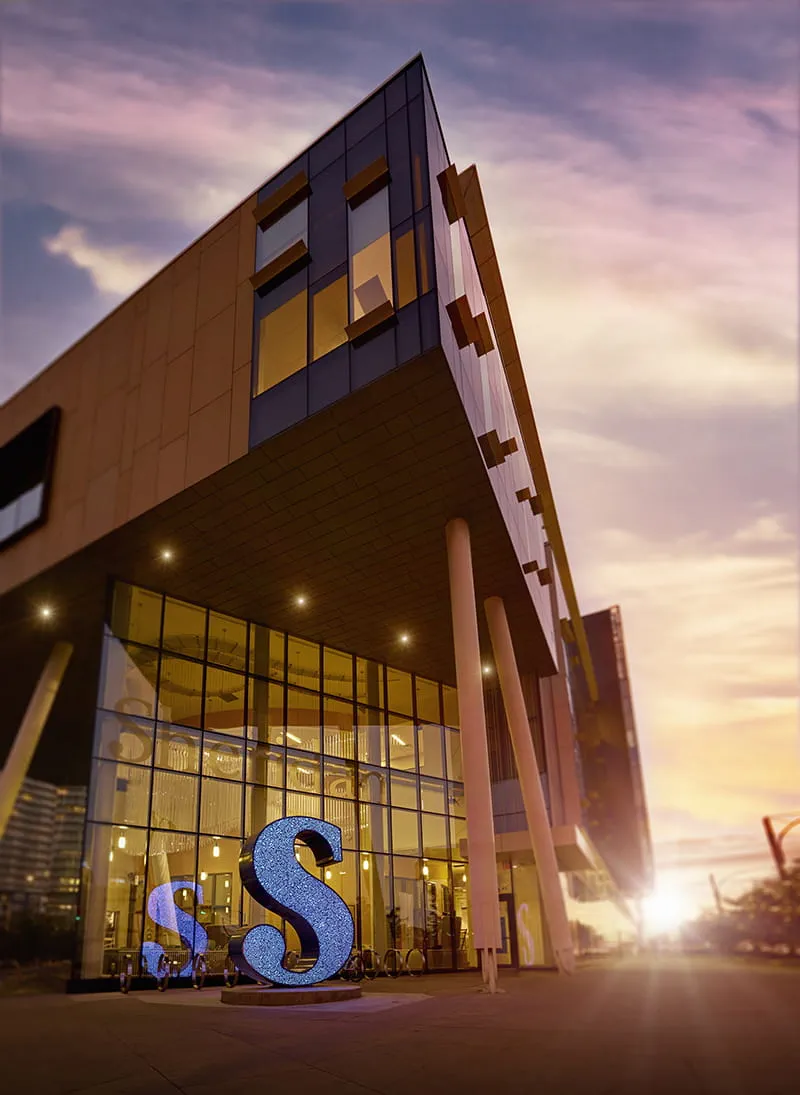
Have a question? Contact us.
We’re happy to help with any questions you may have. Give us a call at any of these numbers and select Option 4 after the prompt, or simply fill out the contact form and we’ll get back to you as soon as possible.
905-845-9430 (Oakville/Mississauga) 905-459-7533 (Brampton)
Contact Centre hours of operation:
Monday–Thursday, 8:30 a.m.–5 p.m. Friday, 8:30 a.m.–4:30 p.m.
- See Sheridan on Facebook
- See Sheridan on Twitter
- See Sheridan on Youtube
Contact Sheridan
You have no saved courses.
Continue to explore your course options.
Your saved courses
I am an International Student
I am not a citizen of Australia or New Zealand
Switch to International
I am a Domestic Student
I am an Australian or New Zealand Citizen
I am an Australian Permanent Resident (including Humanitarian Visa holders)
Switch to Domestic
- Current students
- Flinders dashboard (Okta)
- Ask Flinders
- Flinders Learning Online (FLO)
- Campus map: Bedford Park
- Staff directory
- Jobs at Flinders
- Shop Flinders merchandise
Bachelor of Creative Industries (Writing and Publishing)
Study creative industries (writing and publishing) at flinders.
Start your career as an editor, publisher or writer for a range of industries.
Professional writing skills are in high demand across all industries, and this degree will help prepare you for employment in our diverse and fast-paced economy. In this flexible degree you'll study diverse forms of writing across multiple genres and build a path based on your unique interests, with topics available from across the creative industries, arts and broader university, allowing you to create your own unique story.
Taught by award-winning authors with close links to industry, you'll gain real-world experience to help you gain employment across a range of industries. With small class-sizes and hands-on learning, you'll join a community of likeminded creatives who will become your support network from day one.
What you will study
Download brochure
How to apply
Certificate IV or above
- – City
3 years full-time (or part-time equivalent) Deferrable: Yes
- 2024: $10,800
- – March
- – July
Student and ATAR profile
Save course
3 years full-time Deferrable: Yes
- 2025: $33,800
Entry requirements by country
Apply via SATAC
284231 (City)
Why study Creative Industries (Writing and Publishing) at Flinders
- Study diverse genres and forms (romance, sci-fi, fantasy, literary, series, novels, short stories).
- No.1 in SA in Creative Arts for learner engagement, skills development, student support and teaching quality (The Good Universities Guide 2023 (undergraduate), public SA-founded universities only)
- Ranked above world standard for Research in Performing Arts and Creative Writing (ERA 2018 Outcomes, Flinders University)
- Build your degree based on your unique interests from across the Creative Arts, Industries or broader University – e.g. Visual Effects and Entertainment Design, Film and Television, Costume Design.
- Connect with industry from day one with regular contact with global industry professionals, including bespoke guest lectures, workshops, networking events, and placement opportunities. Our students have worked with award-winning authors, publishers, literary agents, producers, screenwriters and editors.
- Experience a strong sense of community within each creative writing cohort
- Small, bespoke classes taught by award-winning and best-selling writers who are prominent in their fields and highly experienced in the publishing industry
- Build a strong portfolio to gain employment in the industry or to be used for applications into another degree such as the Bachelor of Creative Arts (Creative Writing)
- Gain hands-on experience working on real-world projects
- You’ll collaborate with other students from across the university, not just from the Creative Arts and Industries, but in Science, Engineering, Health, and more
- Gain the skills you need for a career as an editor, publisher or writer across a broad range of industries
- Non-portfolio entry degree
Your career
You will graduate with the skills required to write, edit or publish creatively and/or commercially. Writers, editors and publishers are commonly perceived as being self-employed, but many find employment in government, media, and for non-writing arts organisations. Writing well is an ability sought after across all art-forms and industries.
Potential occupations include:
- marketing and communications
- digital content producer
Potential employers include:
- media corporations
- screen and theatre production companies
- games design companies
- freelance work and independent productions
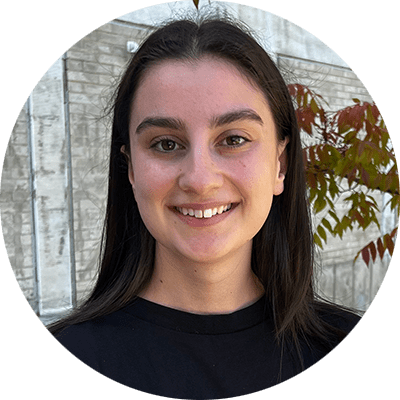
I chose to study Writing and Publishing at Flinders because of the practical experience and flexibility that is possible within this degree. I am able to explore my other interests like philosophy, English and social media studies while also perfecting and gaining experience in my craft.
Lydia alabaster, bachelor of creative industries (writing and publishing), what you will study.
View study program (City)
Practical experience
The degree provides you with practical experience that prepares you for the workforce.
Students will:
- brainstorm and develop ideas under guidance from lecturers and in peer cohorts
- develop skills necessary for turning ideas into stories, novels, and series of novels
- practice engagement with industry professionals, such as editors and publishers.
Study abroad
There are opportunities to take your studies overseas with a student exchange program.
ATAR and Student Profile Information
The table below shows ATAR and Selection Rank data for students offered a place wholly or partly on the basis of ATAR commencing in Semester 1, 2024. It is limited to applicants that have recently completed secondary education (within the last two years). Data may reflect multiple courses available within a suite of courses.
Notes: <5 – less than 5 ATAR based offers made N/A – This course uses additional selection criteria and therefore Selection Rank is not published
The table below gives an indication of the likely peer cohort for new students in this course. It provides data on students who commenced study in this course in Semester 1, 2024 including those admitted through all offer rounds and international students studying in Australia. Applicant background groupings are based on educational background, not basis of admission. Data may reflect multiple courses available within a suite of courses.
Notes: <5 – the number of students is less than 5 N/P – Not published: the number is hidden to prevent calculation of numbers in cells with less than 5 students
Add innovation and enterprise to your degree.
At Flinders University, we recognise that careers are evolving and the workplace of the future will look very different from today.
Whatever undergraduate course you are studying at Flinders, you can add innovation and enterprise electives to your degree to gain new, adaptable and transferrable skills that will equip you for the careers of tomorrow.
How to apply
Choose your preferred course.
Check the entry requirements and admission pathways available to you.
Choose other courses to include in your preferences.
Visit SATAC and submit your application online.
Flinders students can apply to transfer to this course internally. Visit: www.flinders.edu.au/internaltransfer for more information.
Applicants can apply for this course using Year 12 qualifications, previous higher education study, TAFE/VET qualifications, or through adult entry (STAT/Foundation Studies/tertiary preparation course).
For applicants using their SACE (Year 12) results (or equivalent), entry is subject to achieving a minimum selection rank of 60.
Explore our pathways
When choosing your preferences through SATAC, other Flinders degrees you might want to include in your list are:
- Bachelor of Arts
- Bachelor of Media and Communication
Select your course.
Check entry requirements.
Check your eligibility for credit .
Apply online
Obtain certified documents.
Submit your application and documents.
View further details
If you don’t meet our English language entry requirements and need to improve your English language proficiency, you can do so through Flinders University Academy – or our approved English Language Instruction Course for Overseas Students (ELICOS) providers.
This means that you can attend the required English language tuition at approved ELICOS providers and gain direct entry into university without an IELTS or TOEFL test.
Find out more
If you don’t meet our academic entry requirements, you can still gain entry to Flinders University through Flinders University Academy. With a range of diplomas, foundation and English language courses, students can find a direct pathway into the destination degree of their choice.
Course enquiries
Want more information about studying at Flinders University? Contact us to find out more – we’d love to help you decide if Flinders University is the right choice for you.
For all course enquiries phone or email us or complete the course enquiry form.
1300 354 633
Sturt Rd, Bedford Park South Australia 5042
South Australia | Northern Territory Global | Online

Information for
- Future students
- Business and community
- External contractors
Directories
- Campus and locations
- Research Institutes and Centres
Follow Flinders

Website feedback
Accessibility
CRICOS Provider: 00114A TEQSA Provider ID: PRV12097 TEQSA category: Australian University
FOREVER FEARLESS
This website uses cookies.
Flinders University uses cookies to ensure website functionality, personalisation and a variety of purposes as set out in its website privacy statement . This statement explains cookies and their use by Flinders.
If you consent to the use of our cookies then please click the button below:
If you do not consent to the use of all our cookies then please click the button below. Clicking this button will result in all cookies being rejected except for those that are required for essential functionality on our website.
Writing, Literature & Publishing (BA)
About the undergraduate writing, literature and publishing major.
Whether it’s the rise of niche magazines, the return of the physical bookstore, or the growth of digital self-publishing, the written word isn’t disappearing—it’s evolving. Emerson College’s undergraduate Writing, Literature and Publishing BA program provides you with the knowledge, understanding, and skills across both print and digital media that are needed to thrive in this changing literary environment.
From literary history and theory to critical reading techniques and creative writing, the program offers a broad foundation in literature as an art form and publishing as an industry. Housed in the Department of Writing, Literature and Publishing in the School of the Arts , the program’s faculty teach courses in magazine writing, copywriting, creative writing, literary studies, and traditional and digital publishing, exploring topics from a multitude of theoretical and cultural perspectives. Our Writing, Literature and Publishing degree will help you build a future out of bringing all kinds of powerful stories to life.
The WLP program has helped me find a community of people who share similar passions for writing and publishing. By collaborating on on-campus publications, I am able to apply my knowledge from class, while continuing to learn and grow outside of the classroom.
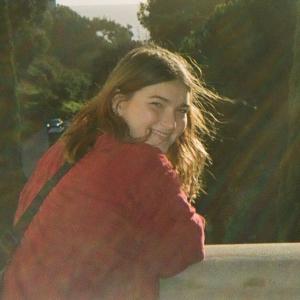
Real-World Experience as a Writing and Publishing Professional
Writing, Literature and Publishing majors have ample opportunity to gain real-world learning experience. Here are a few examples:
- Students can write or work for a number of student literary journals and magazines, including Redivider, em Magazine, The Emerson Review, Concrete Literary Magazine, and Your Magazine.
- Emerson hosts a Pitch Slam event during which students give a one-minute pitch to a board of local and national editors for the opportunity to have their writing published.
- Beyond campus, students have access to coveted internships through our alumni network, which includes New York Times –bestselling authors, editors, and publishing professionals. Recent internship sites include: Boston magazine , Reader’s Digest, and Yale University Press.
- Through a partnership with Penguin Random House, students are mentored during a semester-long program.
Careers for Writing, Literature and Publishing Majors
Our Writing, Literature and Publishing graduates have gone on to become influential authors, screenwriters, critics, publishers, and communicators across media and industries. Examples of careers include:
- Acquisitions Editor
- Content Developer
- Literary Agent
- Marketing Manager
Notable Writing, Literature and Publishing Alumni
- Faye Brennan, Chief Content Officer, Galvanized Media
- Tabitha Dulla, Senior Managing Editor, Penguin Random House
- Jaweed Kaleem, National Correspondent, Los Angeles Times
- Rose Pleuler, Associate Editor, HarperCollins Children’s Books
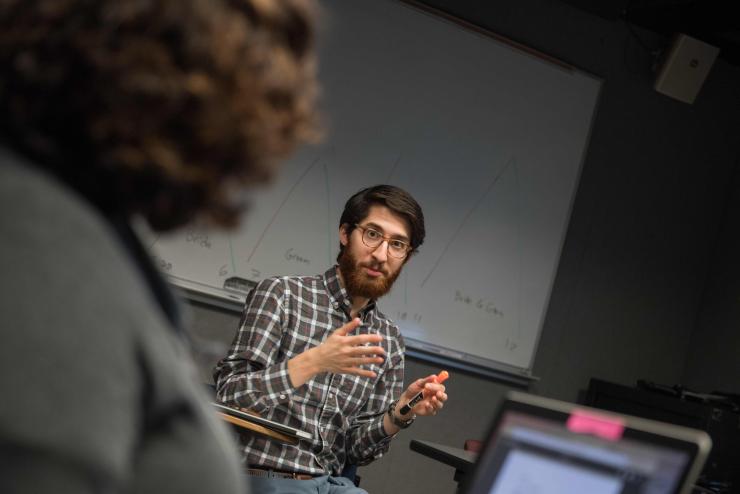
Meet Our Faculty
Ready to pursue your daring ideas.
- Connect With Us
- Learn More about the Undergraduate Writing, Literature and Publishing (BA) Program
- Apply to the Undergraduate Writing, Literature and Publishing (BA) Program
- Learn More about Our 4+1 Bachelor’s to Master’s Program
Media Gallery Writing, Literature and Publishing
View our Writing, Literature and Publishing program in action
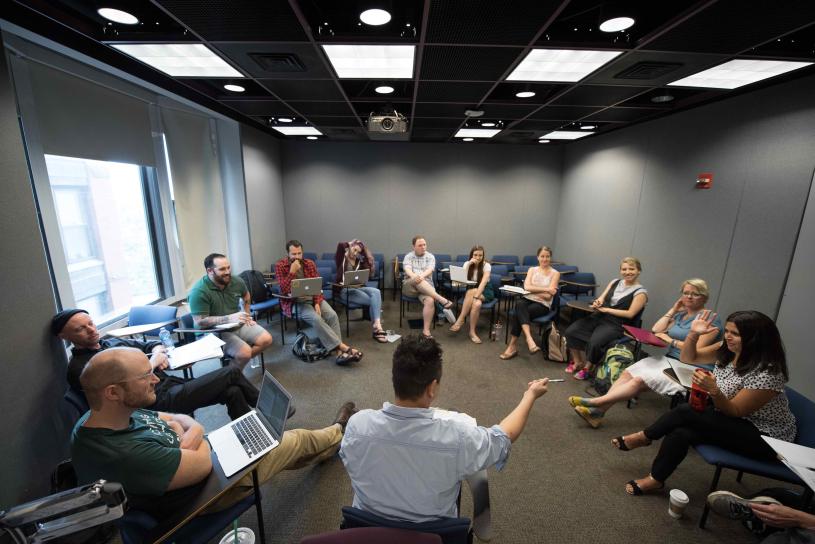
- For Current Students
- For Parents
- For Faculty
- For the Media

Online Students
For All Online Programs
International Students
On Campus, need or have Visa
Campus Students
For All Campus Programs
Online Creative Writing Degrees Bachelor of Arts (BA)

Cost per credit $330
Total courses 40
Term length 8 weeks
Program Overview Why get a bachelor’s in creative writing online?
Unleash your creativity while honing your writing skills in the Bachelor of Arts (BA) in Creative Writing and English program at Southern New Hampshire University. Whether you simply have a passion for storytelling or want to pursue a career using your talents, the online creative writing program offers a supportive community, comprehensive curriculum and flexible format that can help you achieve your goals.
Skills you'll learn:
- Writing and editing techniques
- Literary analysis and critical-thinking
- Application of storytelling elements
- Literary form, genre, structure and style
- Use of genre conventions and techniques
- Professional portfolio building
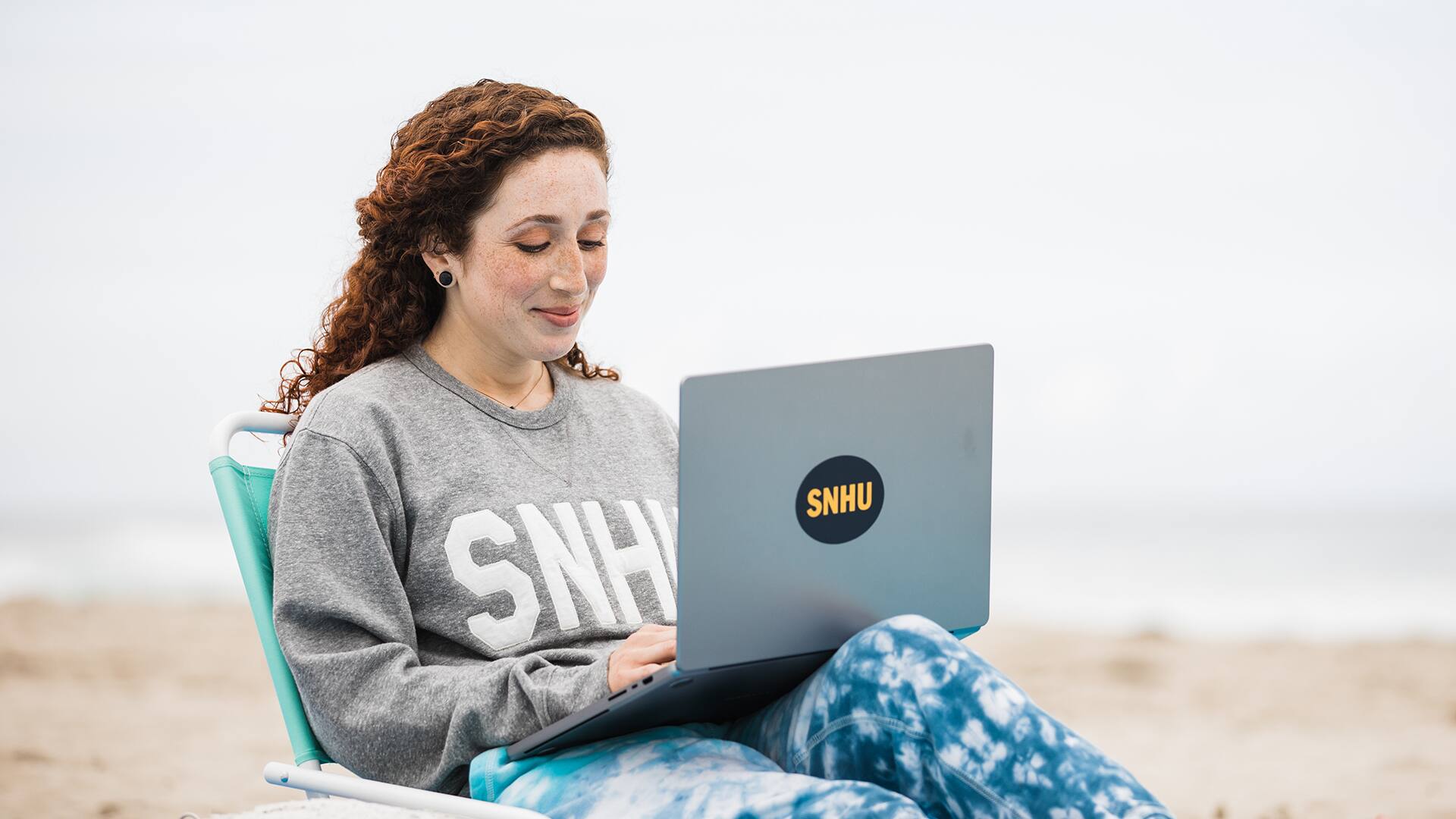
Courses & Curriculum Online creative writing courses built for aspiring writers
In the online BA Creative Writing program, you'll push your creative boundaries, develop a unique voice and gain insights into the publishing industry. You'll also have the opportunity to have your work published in The Penmen Review, our own online journal for writers. And with 4 concentrations to choose from, you can choose to focus your studies in fiction, nonfiction, poetry or screenwriting.
Plus, this program offers a significant number of free electives, helping you maximize transfer credits and explore topics that interest you.
BA Creative Writing concentrations
When you choose to study creative writing at SNHU, you have the option to stay with the general track – which gives you the flexibility to study a variety of genres – or add one of our 4 concentrations to your degree : fiction, nonfiction, poetry or screenwriting.
Explore your creative boundaries, perfect your craft and dive deeper into your preferred genre in the online Bachelor of Arts (BA) in Creative Writing and English with a concentration in Fiction Writing . From fantasy to sci-fi, mystery to young adult, you'll be tasked with developing an appreciation for all forms of fiction while embracing the style of writing that you're drawn to and bringing your original stories to life.
Balancing craft and critical analysis, this concentration helps you hone your writing skills and study philosophy of composition. You'll enhance your fundamental knowledge of fiction writing's most crucial elements — giving you a powerful understanding of plot, character development, narrative voice and other mechanics of creative writing.
Career outlook:
The U.S. Bureau of Labor Statistics notes that a degree and publication is typically required for a full-time writing position. 1 Writers who concentrate in fiction have career opportunities in a range of professions, including content writing, editing, copywriting, publishing, communications and more.
Courses may include:
- New Media: Writing and Publishing
- Fiction Writing Workshop
- Intermediate Fiction Writing Workshop
- Advanced Fiction Writing Workshop
Combine research skills and reflection with compelling storytelling when you enroll in the nonfiction writing degree online at Southern New Hampshire University.
Our online Bachelor of Arts (BA) in Creative Writing and English with a concentration in Nonfiction delves into a wide variety of styles and subjects – everything from the personal essay to autobiography, memoir, travel writing and magazine features. Through this program, you'll acquire a powerful understanding of research, narrative voice and other mechanics of creative writing.
Nonfiction writers can publish in magazines, newspapers, and literary journals, as well as find career opportunities in digital content writing, social media, communications, copywriting and editing.
- Nonfiction Writing Workshop
- Intermediate Nonfiction Writing Workshop
- Advanced Nonfiction Writing Workshop
The online Bachelor of Arts (BA) in Creative Writing with a concentration in Poetry degree program is an opportunity for aspiring poets to find inspiration, engagement and creative collaboration with peers and faculty alike. Our specialized program enables you to hone your craft and unleash your imagination, helping you create imagery in verse.
While a poetry degree is valuable in and of itself, it can also prepare you for many professional paths. You can explore careers in creative writing, advertising, journalism, publishing and advertising copywriting. Southern New Hampshire University also offers an online Master of Arts in English and Creative Writing with a concentration in Poetry.
Career paths with a BA in creative writing include work as a creative writer, advertising copywriter, journalist, publisher or poet. Writers have also found careers in communications, digital content writing and editing.
- Poetry Writing Workshop
- Intermediate Poetry Writing Workshop
- Advanced Poetry Writing Workshop
Whether you have dreams of writing blockbusters, developing documentaries or working with other writers on sitcoms, the online Bachelor of Arts (BA) in Creative Writing and English with a concentration in Screenwriting is an excellent way to sharpen your writing skills and put your passion to work.
The classes in this specialized online screenwriting degree are based on a comprehensive study of creative writing with a special focus on story structure, character development and the visual medium of film. You'll have the opportunity to explore all of the forms that screenwriting takes – feature-length and short films, television episodes and miniseries, commercials and internet-based video.
Designed by experienced and distinguished faculty, this creative writing program will give you a powerful understanding of how story, character, theme, action, visuals and dialogue intertwine to create a compelling moment in time.
Blockbuster movies, independent films and shorts, commercials, television dramas and sitcoms all rest their success on the backbone of their scripts.
Screenwriters have lots of options when it comes to navigating their careers. You could pursue independent work and make your stories come to life – or you could develop scripts for specific projects that need a writer's touch.
- Introduction to Screenwriting Workshop
- Intermediate Screenwriting Workshop
- Advanced Screenwriting Workshop
Online creative writing courses for aspiring writers
In your major courses, you'll learn the terminology, conventions and techniques needed to strengthen your skills in literary analysis, writing and editing. You'll also develop these skills and gain valuable feedback in collaborative workshops with peers and faculty from all over the country.
Visit the course catalog to view the full BA in Creative Writing & English curriculum .
The Commons: SNHU's gen ed program
All undergraduate students are required to take general education courses , which are part of SNHU's newly redesigned program, The Commons. The goal of The Commons' curriculum is to empower you with some of the most in-demand skills, so you can succeed not only in your academic career, but in your personal and professional life too.
PC (Windows OS) Technical Requirements
Apple (mac os) technical requirements.
Additional Information:
- Laptop or desktop? Whichever you choose depends on your personal preference and work style, though laptops tend to offer more flexibility.
- Note: Chromebooks (Chrome OS) and iPads (iOS) do not meet the minimum requirements for coursework at SNHU. These offer limited functionality and do not work with some course technologies. They are not acceptable as the only device you use for coursework. While these devices are convenient and may be used for some course functions, they cannot be your primary device. SNHU does, however, have an affordable laptop option that it recommends: Dell Latitude 3301 with Windows 10.
- Office 365 Pro Plus is available free of charge to all SNHU students and faculty. The Office suite will remain free while you are a student at SNHU. Upon graduation you may convert to a paid subscription if you wish. Terms subject to change at Microsoft's discretion. Review system requirements for Microsoft 365 plans for business, education and government.
- Antivirus software: Check with your ISP as they may offer antivirus software free of charge to subscribers.
Licensure and Certification Disclosures
SNHU has provided additional information for programs that educationally prepare students for professional licensure or certification. Learn more about what that means for your program on our licensure and certification disclosure page .
Apply for free in minutes
Our no-commitment application can help you decide if SNHU is the right college for you and your career goals. Apply up until 2 days before the term starts!
Upcoming term starts: March 3, 2025 | May 5, 2025
Next term starts: Jan. 6, 2025
Online student experience what’s it like going to snhu.
Attending college online at SNHU can be a life-changing experience. In fact, 93.2% of online students would recommend SNHU according to a 2023 survey with 21,000+ respondents.
What to expect:
.b{fill:#21386d;}.c{fill:#21386e;} 8-week terms, .cls-1 { fill: #21386e; } learn around your schedule, .st0{fill:#f1f2f2;} .st1{fill:#f2bb44;} .st2{fill:#23386e;} .st3{fill:none;stroke:#23386e;stroke-width:2.5;stroke-linecap:round;stroke-miterlimit:10;} .st4{fill:none;stroke:#f1f2f2;stroke-miterlimit:10;} .st5{fill:#25396a;} .st6{fill:#21386d;} .st7{fill:none;} .st8{fill:#f1bb45;} .st9{fill:#21396d;} .st10{fill:#22356b;} .st11{fill:none;stroke:#23386e;stroke-width:4;stroke-linecap:round;stroke-miterlimit:10;} .st12{fill:#ffffff;stroke:#21376d;stroke-width:4;stroke-linecap:round;stroke-linejoin:round;stroke-miterlimit:10;} .st13{fill:none;stroke:#21376d;stroke-width:4;stroke-linecap:round;stroke-linejoin:round;stroke-miterlimit:10;} .st14{fill:#21376d;} .st15{fill:none;stroke:#21376d;stroke-width:4;stroke-linecap:round;stroke-miterlimit:10;} .st16{fill:none;stroke:#23386e;stroke-linecap:round;stroke-miterlimit:10;} .st17{fill:none;stroke:#21386d;stroke-width:4;stroke-linecap:round;stroke-miterlimit:10;} .st18{fill:#ffffff;stroke:#21386d;stroke-width:4;stroke-linecap:round;stroke-miterlimit:10;} .st19{fill:none;stroke:#23386e;stroke-width:2;stroke-linecap:round;stroke-miterlimit:10;} .st20{fill:#ffffff;stroke:#21376d;stroke-width:2;stroke-linecap:round;stroke-linejoin:round;stroke-miterlimit:10;} .st21{fill:none;stroke:#21376d;stroke-width:2;stroke-linecap:round;stroke-linejoin:round;stroke-miterlimit:10;} .st22{fill:none;stroke:#21376d;stroke-width:2;stroke-linecap:round;stroke-miterlimit:10;} .st23{fill:none;stroke:#21386e;stroke-width:0.75;stroke-linecap:round;stroke-miterlimit:10;} .st24{fill:none;stroke:#091c38;stroke-width:2;stroke-linecap:round;stroke-linejoin:round;stroke-miterlimit:10;} .st25{fill:#ffffff;stroke:#23386e;stroke-width:4;stroke-linecap:round;stroke-miterlimit:10;} .st26{fill:#091c38;} .st27{fill:#ffffff;stroke:#21376d;stroke-width:4;stroke-linecap:round;stroke-miterlimit:10;} .st28{fill:#ffffff;stroke:#23386e;stroke-width:2;stroke-linecap:round;stroke-miterlimit:10;} .st29{fill:#ffffff;stroke:#21376d;stroke-width:2;stroke-linecap:round;stroke-miterlimit:10;} .st30{fill:#ffffff;} 24/7 online support, what does an online course look like.
You’ll take your courses within SNHU’s Brightspace platform. This is where you’ll find your:
- Schedule of weekly assignments
- Discussion boards
- Instructor announcements

What support services are available?
- Chat with your advisors Get hands-on help from dedicated academic and career advisors.
- Drop in for tutoring Work with a tutor, any time of the day or night – no appointment necessary.
- Learn from industry professionals Instructors lead discussions and offer guidance – and they’re just an email away.
- Use the online library Access 600,000+ resources or chat with a librarian 24/7.
- Reach out for accessibility help Receive accommodations as an eligible student with disabilities.
- Focus on your well-being Connect with professionals to improve your health and wellness.
Learn from faculty with a passion for writing
SNHU's creative writing faculty have a shared passion for writing and student success. Throughout your program, you'll learn from published writers, professional editors, publishers and established literary critics – subject-matter experts who can help guide you to improving your craft.
Featured Faculty

Position Associate Dean, Creative Writing
Joined SNHU 2014
- MFA in Creative Writing-Fiction from Boise State University
- BA in Creative Writing with a minor in English Literature from Grand Valley State University
What our instructors have to say

"Throughout the creative writing program, students are given tools, resources, and lots of valuable feedback to strengthen their writing skills."
Chris Sullivan , adjunct instructor at SNHU
At Southern New Hampshire University, you'll have access to a powerful network of more than 400,000 students, alumni and staff that can help support you long after graduation. Our instructors offer relevant, real-world expertise to help you understand and navigate the field. Plus, with our growing, nationwide alumni network, you'll have the potential to tap into a number of internship and career opportunities.
Recently, SNHU has been nationally recognized for leading the way toward more innovative, affordable and achievable education:
- U.S. News & World Report Named SNHU the 2024 Most Innovative University in the North
- The United States Distance Learning Association (USDLA) Awarded SNHU the 21st Century Distance Learning Award for Excellence in Online Technology
- Google.org Gave SNHU a $1 million grant to explore soft skills assessments for high-need youth
Founded in 1932 , Southern New Hampshire University is a private, nonprofit institution with over 180,000 graduates across the country. SNHU is accredited by the regional accreditor New England Commission of Higher Education (NECHE), which advocates for institutional improvement and public assurance of quality.

Admission Applying to SNHU is fast and free
No application fee. No test scores. And no college essay. Just a simple form with basic information. It’s another way SNHU helps you reach your goals sooner.
All it takes is 3 simple steps
It's easy, fast and free.
Whether you're applying for an undergraduate or graduate degree, you’ll fill out a form to verify your previous education experience. As part of our admissions process, we'll help you request transcripts from your previous school(s) to see if you can transfer any credits into your SNHU program! (Also for free!)
After reviewing your official evaluation, you can decide if SNHU is right for you! If you choose to enroll, just pick your start date and get ready for classes to begin.
Talk to an admission counselor: 888.327.SNHU | [email protected]
Accreditations
SNHU is accredited by the regional accreditor the New England Commission of Higher Education (NECHE) . The university also carries specialized accreditations for some programs.
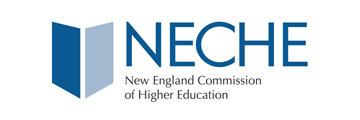
Tuition Cost & Savings College can be more affordable than you think
As a nonprofit university, SNHU offers some of the lowest online tuition rates in the country. And when you work with our Financial Services team, we'll explore ways to help you save even more on your education – and customize a payment plan that works for you.
Online undergraduate tuition
*before previously earned credits are applied
Tuition rates are subject to change and are reviewed annually.
**Note: Students receiving this rate are not eligible for additional discounts.
Additional costs: Course materials vary by course.
Transfer credits and lower your cost by:
If 30 of your prior learning credits ($330/credit) are accepted toward your bachelor’s degree.
Your remaining tuition cost: $29,700
If 45 of your prior learning credits ($330/credit) are accepted toward your bachelor’s degree.
Your remaining tuition cost: $24,750
If 60 of your prior learning credits ($330/credit) are accepted toward your bachelor’s degree.
Your remaining tuition cost: $19,800
If 75 of your prior learning credits ($330/credit) are accepted toward your bachelor’s degree.
Your remaining tuition cost: $14,850
If 90 of your prior learning credits ($330/credit) are accepted toward your bachelor’s degree.
Your remaining tuition cost: $9,900
How we estimate your tuition cost:
We look at the cost per credit multiplied by the number of credits you need to earn for a bachelor's degree. Most bachelor's degrees require 120 credits. SNHU allows you to transfer in up to 90 credits, requiring a minimum of 30 credits to be taken at SNHU. This is only a tuition estimator, and doesn't account for other fees that may be associated with your program of choice.
Ways to save on online tuition
Transfer up to 90 credits toward your bachelor's degree program at SNHU. If you’ve taken one course or many, we’ll evaluate them for you.
Fill out the FAFSA to see if you’re eligible for grants or work-study. (You could also be offered loans, though you’ll have to pay those back later.)
Earn credits in leadership, technology and more – while taking advantage of a 30% online undergraduate tuition discount for active-duty service members and spouses.
Getting free money for college – from SNHU or an outside organization – could help you save hundreds or even thousands of dollars.
Bring in credits from popular options like CLEP, Sophia Learning, Google and other common credit for prior learning (CPL) experiences.
Receive an online tuition discount if your organization has partnered with SNHU for educational benefits. And consider asking your employer about tuition reimbursement.
Career Outlook What can I do with a bachelor’s in creative writing?
With storytelling at the heart of communication, the bachelor's in creative writing program can help set you up for success in a variety of roles in writing, editing, publishing and beyond. And with today's remote work opportunities, it's easy for writers and authors to work from just about anywhere they have internet access – meaning jobs aren't limited to major cities anymore.
From the entertainment industry to marketing and tech, employers of all kinds seek skilled writers for a variety of positions. In addition to the technical skills you'll gain in a creative writing degree program, your courses will help you develop in areas like creativity, critical-thinking, persuasion and social perceptiveness — skills that are valuable in any career.
Occupations
If exploring creative careers sounds appealing, an online creative writing degree can prepare you for a variety of positions, including:
Use storytelling skills to write everything from children’s books and novels to biographies, essays and memoirs.
Apply your understanding of the written word to plan, review and revise content for publication in books, periodicals or online platforms.
Promote a product, service or organization with content for advertisements, marketing campaigns or websites.
Research topics, investigate story ideas and interview sources to write compelling nonfiction articles for newspapers, magazines, blogs and television news programs.
Use the power of writing to create visual and auditory experiences for everything from major blockbuster films to television episodes and commercials.
Write speeches for business leaders, politicians and others, using words to engage with and move an audience.
Increase in writer and author opportunities through 2032, projected by the U.S. Bureau of Labor Statistics. 1
Median annual pay for writers and authors as of May 2023, according to the BLS. 1
Understanding the numbers When reviewing job growth and salary information, it’s important to remember that actual numbers can vary due to many different factors—like years of experience in the role, industry of employment, geographic location, worker skill and economic conditions. Cited projections do not guarantee actual salary or job growth.
What SNHU students are saying
Frequently Asked Questions
There are a wide variety of writing degrees that can help prepare you for your ideal writing career, including a BA in Creative Writing and graduate programs such as our online MA and MFA in creative writing programs and low-residency MFA in fiction or nonfiction.
A creative writing bachelor’s degree will give you a strong foundation of writing skills and help you hone your craft. You’ll also gain a better understanding of the publishing industry and build a portfolio of writing samples you can use when applying for jobs.
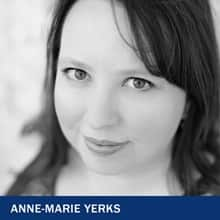
SNHU's creative writing degree offers 4 concentrations to help you focus on a specific genre, improve your knowledge, develop genre-specific skills and help you become more marketable in the workforce.
“It’s important to have a degree in writing or English because you’ll learn how to write properly and get practice writing in all different forms,” said Anne-Marie Yerks , adjunct faculty for the MFA in fiction writing program at Southern New Hampshire University.
As a creative writing major, you'll build a strong understanding of the English language and learn how to use the elements of storytelling to write everything from nonfiction essays to poetry.
But writing won't be your only subject of study. You'll also read well-known literature, analyzing the work of writers like Shakespeare to inspire and inform your own writing.
You'll learn from professors with real-world experience as authors, publishers and literary critics and will explore the workings of the publishing industry.
Nicholas Patterson '22 , has found that many of his professors are passionate about the subjects they teach.
"For example," he said, "I took a Shakespeare class and my professor had been studying Shakespeare for most of his life and shared his passion in the course by encouraging his students and their ideas."
As a creative writing major, you'll graduate with the key critical thinking, communication and collaboration skills you need for a career as a journalist, editor, copywriter, author and more.
The best writing degree is the one that helps you prepare for the job you want and gives you a strong foundation of writing skills and experience.
At Southern New Hampshire University, creative writing students dive deep into the English language and great works of literature. By reading and analyzing great works of literature, you'll be able to learn the art of storytelling and develop your own writing style.
Interested in a particular writing career? Degree concentrations allow you to focus your learning on a specific genre of creative writing and can give you a leg up when applying to writing jobs.
If you dream about becoming a novelist, a bachelor’s degree in fiction writing will prepare you for a life of storytelling, helping you hone your writing skills and enhance your understanding of plot, narrative voice and character.
A bachelor’s degree in nonfiction writing can prepare you for a career as a journalist, author or communications manager, helping you combine research and observation with compelling storytelling.
If poetry is your passion, a creative writing bachelor’s degree with a poetry concentration will help you develop your personal style and build a portfolio. You’ll study the poetry of others and regularly write, read and critique poems with your peers in poetry workshops.
A screenwriting degree offers a special focus on story structure, character development and the visual medium of film. You’ll explore writing for feature-length and short films, television episodes, commercials and internet-based video.
It depends. SNHU’s creative writing bachelor’s degree program requires 120 credits to graduate and typically takes about 4 years to complete.
If you’ve attended college before, you may be able to transfer credits to your degree program and save time (and money). We accept up to 90 transfer credits toward your program here, with free transfer credit evaluations that let you see how your existing credits can be applied to your new degree.
It's also important to consider your other responsibilities. If you can attend school full time and take on a full course load each semester, you’ll complete your degree faster. If you work full time or have a family and need to fit your learning into an already busy schedule, you may need to complete your degree at a slower pace.
Starting a writing career doesn’t have to mean becoming an author. In fact, writers are needed across a variety of industries, from business and entertainment to engineering and marketing.
The many writing jobs you may explore include:
- Author: Use storytelling skills to write everything from children’s books and novels to biographies, essays and memoirs.
- Editor: Apply your understanding of the written word to plan, review and revise content for publication in books, periodicals or online platforms.
- Copywriter: Promote a product, service or organization with content for advertisements, marketing campaigns or websites.
- Journalist: Research topics, investigate story ideas and interview sources to write compelling nonfiction articles for newspapers, magazines, blogs and television news programs.
- Screenwriter: Use the power of writing to create visual and auditory experiences for everything from major blockbuster films to television episodes and commercials.
- Speechwriter: Write speeches for business leaders, politicians and others, using words to engage with and move an audience.
- Technical writer: Prepare instruction manuals and how-to guides to clearly communicate complex ideas and technical information.
Of course. Screenwriting requires a strong foundation of writing skills and creativity to take a film, television episode or commercial from an idea to the screen.
Screenwriters are the storytellers of the entertainment industry. As a screenwriter, you’ll use character, dialogue, setting and other visuals to engage an audience.
A screenwriting degree can help set you apart from others in the industry and give you the skills you need to bring a story to life on screen.
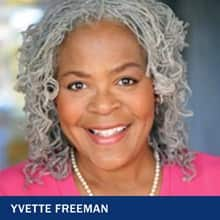
“Everybody in Hollywood has a screenplay in their drawer,” said Freeman. “I want to pull mine out and get them made. No more hiding.”
SNHU’s Fall Fiction Contest is an annual short story competition that provides writers a chance to show off their skills and be rewarded for it with an SNHU scholarship and publication in The Penmen Review . Beginning and seasoned authors alike (excluding SNHU faculty and staff) are welcome to enter if they are 18+ and based in the continental United States. All guideline-abiding submissions are carefully evaluated by a panel of experts and put to a public vote based on criteria like originality and character arc. The end result? Five lucky winners who gain both bragging rights and tier-based prizes!
Learn more about SNHU’s Fall Fiction Contest and what you could win.
Related Programs
Related articles.

Sources & Citations
1 Bureau of Labor Statistics, U.S. Department of Labor, Occupational Outlook Handbook, on the internet, at https://www.bls.gov/ooh/media-and-communication/writers-and-authors.htm (viewed April 19, 2024)
Cited projections may not reflect local and/or short-term economic or job conditions and do not guarantee actual job growth.
- Search entire site
- Search for a course
- Browse study areas
Analytics and Data Science
- Data Science
- Business Analytics
- Event Management
- Human Resources
- MBA Programs
- Social Impact
- Supply Chain Management
- Communication
- Animation Production
- Digital and Social Media
- Media Arts and Production
- Media Business
- Music and Sound Design
- Screen Arts Production
- Social and Political Sciences
- Strategic Communication
- Writing and Publishing
Design, Architecture and Building
- Architecture
- Construction
- Interior Architecture
- Landscape Architecture
- Local Government
- Product Design
- Project Management
- Property and Real Estate
- Urban Planning
- Visual Communication
- Secondary Education
- TESOL and Applied Linguistics
- Education Learning and Leadership
- Learning Design
- Primary Education
- Engineering
- Biomedical Engineering
- Civil and Environmental Engineering
- Electrical and Electronic Engineering
- Mechanical and Mechatronic Engineering
- Nursing and Midwifery
- Sport and Exercise
- Public Health
Health (GEM)
- Allied Health
- Information Technology
- Computer Science
- Games, Graphics and Multimedia
- Systems Design and Analysis
- Artificial Intelligence
- Cybersecurity and Networking
- International Studies
- Criminology
- Sustainability and Environment
- International Relations
- Practical Legal Training
- Commercial and Business Law
- Juris Doctor
- Legal Studies
- Intellectual Property
- Migration Law and Practice
- Biotechnology
- Environmental Sciences
- Food Science
- Forensic Science
- Mathematics, Statistics and Quantitative Finance
- Medical Science
- Pharmaceutical Science
- Physics and Quantum Technology
- Transdisciplinary Innovation
- Creative Intelligence and Innovation
- Entrepreneurship
- Data Science and Innovation
- Sustainability and Innovation
Bachelor of Communication (Writing and Publishing)
- Overview Subjects, careers and fees
- Course experience See what it's like to study at UTS
- How to apply Requirements and selection criteria
Students who commenced the Bachelor of Communication (Creative Writing) before 2022 can view their revised program of study here .
For those with an interest in different forms of creative writing and publishing, this practice-based course provides the skills and industry knowledge to work in the field. The Bachelor of Communication (Writing and Publishing) at UTS is an industry-led course, designed and taught by a team of award-winning published authors, editors, scholars and industry professionals. Writing and Publishing builds students’ knowledge of Australian and global publishing contexts, as well as writing and storytelling across an array of formats, like fiction and nonfiction, screenwriting, digital content and games. Students also develop strengths in critical thinking, research, editing and publishing and storytelling in broader contexts – all skills transferable to a wide range of industries and careers.
To hone their skills, students engage in interactive classes led by skilled practitioners. Subjects often rely on workshopping, with students learning key concepts, applying these to their own writing, and collaborating with other students to provide and receive feedback. In this way the course provides students with a brilliant opportunity to be a part of a unique writer’s studio and develop their craft, finishing with a folio of works covering key forms and genres.
Make an enquiry
Course aims
The aims of this degree are:
- to produce graduates with a strong grounding in, and comprehensive knowledge of, contemporary writing practices and the publishing industry,
- to enable students to develop innovative, creative and ethical practices as writers and editors, appropriate to a variety of professional and cultural contexts,
- to equip students with the critical, creative and collaborative skills, aptitudes and experiences to gain employment or progress to further study.
Innovation and Transdisciplinary program
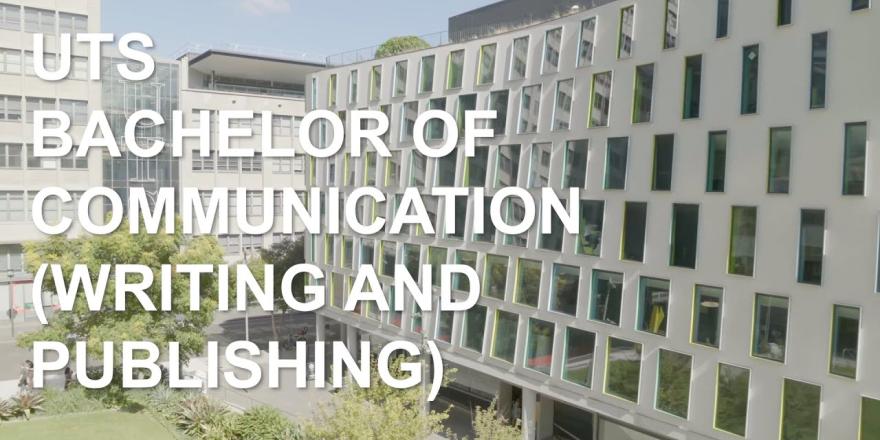
UTS Bachelor of Communication (Writing and Publishing) video transcript
[Text] UTS Bachelor of Communication (Writing and Publishing) [Music] Aerial shot of UTS campus Students with books sit and talk on Alumni green [Text] Discover the craft of writing and storytelling across different formats and genres Students and staff in classrooms Book launch event [Text] Learn from acclaimed writers and publishers [Text] Build a portfolio of work to take to industry Students and staff discuss work around desks A student picks up a book, writes notes [Text] Contribute to the UTS Writer’s Anthology or work on the editorial team Student writes on a laptop A group of students discuss a task with an academic [Text] Study a second major to broaden your skillset A student writes in a journal Students discuss their work [Text] Study Writing and Publishing at UTS [Text] Copyright University of Technology Sydney 2023, CRICOS 00099F, TEQSA PRV12060
Typical course programs are shown below for students commencing in either Autumn or Spring session who are completing 8 credit point elective subjects. Students also have the option to complete 6 credit point elective subjects under CBK92062 Elective Choice instead.
All students choose a second major stream when enrolling in their first session. This 18 credit point stream consists of three major subjects from another major (excluding Media Arts and Production).
Students who choose not to continue with their second major choice can continue in their course by choosing 30 credit points of electives (i.e., five 6 credit point subjects) - this should be requested via eRequest.
Second year
The Bachelor of Communication (Honours) ( C09047 ) is available with an additional year of full-time study for eligible students.
Fourth year
Course fees.
For relevant fee information, please choose from the following:
Local student
All students at UTS pay tuition fees to contribute towards the cost of their studies.
In 2024 all offers made to domestic undergraduate students will be for Commonwealth Supported Places (CSP) , which means that the Australian government makes a substantial contribution towards the cost of your education, and you pay the balance through student contributions.
The amount you pay depends on your area of study and the number of credit points (cp) in which you enrol. At UTS 48 credit points is considered to be one Equivalent Full Time Study Load (EFTSL).
The table to the right shows the amount a student can expect to pay for one year of full-time study (1.0 EFTSL).
Students can choose to pay their student contribution upfront, or if eligible, can defer their fees through HECS-HELP .
In addition to tuition fees, students are required to pay a Services and Amenities Fee (SSAF). The purchase of textbooks and other course materials may also result in additional cost.
You can calculate your student contribution as a percentage of the amounts shown on the table. Fee rates are divided into four bands covering broad discipline areas. It is important to note that a particular subject within a course may fall within a different band.
For example, if you are enrolled in a 6-credit point Architecture subject , your contribution would be 6/48 x $9,314 = $1,164 .
Student contribution amounts for 2025 commencing students
International student.
Tuition fees for international undergraduate students can be found using tuition fees search .
Tuition fees must be paid in advance each session and are subject to annual increase. Fees for future year(s) published in fees search, whilst unlikely to change, are estimates only. UTS makes every effort to provide up to date future year(s) fee estimates and to limit any changes, however, UTS reserves the right to vary fees for future year(s) at any time.
All international students should familiarise themselves with the following documents:
- Protocol on refund of fees for international students - contains the refund of fees information for international students.
- Tuition Protection Service - designed to ensure that students receive the tuition they have paid for
In addition to tuition fees, students may be required to pay a Student Services and Amenities Fee (SSAF). Textbooks and other course materials will also result in additional costs.
UTS Alumni save 10% : alumni.uts.edu.au/advantage
For further information on costs related to your study at UTS, visit the international students' fees information page .
To increase career flexibility, students can add a second major from five of the other majors offered in the Bachelor of Communication , and build further skills and portfolios that equip them for a range of work options in media and communication. These courses give students practical and transferrable skills for the expanding media industries.
Graduates of this course have found work as writers of fiction and nonfiction in a variety of forms, both as freelance writers and in media organisations. These skills are transferable to careers in communication and marketing, and in organisations with communication processes, such as government, NGOs, industry and cultural groups.
Course structure
Course structure explained.
Students must complete 144 credit points consisting of 24 credit points of core subjects, a 48-credit-point major, a potential 48-credit-point second major, and 24 credit points of electives.
Industrial training/professional practice
Students participate in two Work-Integrated Learning subjects. In the second year of their degree, in a simulated work environment, they edit and produce a literary journal, experiencing each stage of the publication process first-hand. In their third year, students undertake an inquiry-based project investigating current issues in writing and publishing, with input from industry mentors. As writers in their final year, they develop an extended piece of creative writing in a form or genre of their choice.
Course completion requirements
Additional information, course duration.
The course is offered on a three-year, full-time basis.
Admission requirements
Applicants must have completed an Australian Year 12 qualification, Australian Qualifications Framework Diploma, or equivalent Australian or overseas qualification at the required level.
The English proficiency requirement for international students or local applicants with international qualifications is: IELTS Academic: 6.5 overall with a writing score of 6.0; or TOEFL iBT: 79-93 overall with a writing score of 21; or AE5: Pass; or PTE: 58-64 with a writing score of 50; or C1A/C2P: 176-184 with a writing score of 169.
Eligibility for admission does not guarantee offer of a place.
Visa requirement: To obtain a student visa to study in Australia, international students must enrol full time and on campus. Australian student visa regulations also require international students studying on student visas to complete the course within the standard full-time duration. Students can extend their courses only in exceptional circumstances.
Check to see if there are additional admission requirements for this course. Additional information relating to this course, including the ATAR profile of domestic students who commenced this course in Autumn 2022, is located under UTS' admissions requirements , alongside information relating to the commencing student cohort who were enrolled in this course past the Autumn 2022 census date.
If you don't meet the admission requirements for this course, there may be alternative pathways to help you gain admission.
Inherent requirements
Inherent requirements are academic and non-academic requirements that are essential to the successful completion of a course. For more information about inherent requirements and where prospective and current students can get assistance and advice regarding these, see the UTS Inherent requirements page.
Prospective and current students should carefully read the Inherent Requirements Statement below and consider whether they might experience challenges in successfully completing this course.
UTS will make reasonable adjustments to teaching and learning, assessment, professional experiences, course related work experience and other course activities to facilitate maximum participation by students with disabilities, carer responsibilities, and religious or cultural obligations in their courses.
For course specific information see the Communication Inherent (Essential) Requirements Statement .
ATAR and selection ranks
To find out further information regarding ATAR and selection ranks from previous applicants who received an offer to this course, please visit our Admissions Stats Tool
Year 12 adjustment factor scheme
Alternative entry.
The Faculty of Arts and Social Sciences has established credit recognition packages with the following institutions:
- UTS College: Diploma of Communication
- Nanyang Polytechnic, Singapore
- Temasek Polytechnic, Singapore
- Ngee Ann Polytechnic, Singapore
Scholarships and prizes
Scholarships, for communication students.
- ARC Linkage Project in digital-twin driven prognostics for the mining industry
- Crescent Leadership Scholarship
- Ericsson Technology Scholarship
- Global Exchange Scholarship
- International Research Training Program Scholarship (IRTP)
- Mentoring of Women in Engineering and IT Scholarship
- RACE for 2030 CRC Industry PhD Scholarship
- Rosemary Johnston HDR Scholarship
- Ross Milbourne Elite Athlete Scholarship
- Scape Accommodation Scholarship
- Telstra Enterprise Certitude Scholarship
- Thrive: Next Generation Graduates - PhD – Social Science and Policy
- UTS Diploma to Degree Pathway Scholarship
- UTS Diploma to Degree Scholarship for High School Graduates
- UTS Housing Resident Networker Scholarship
- UTS Scholarship for European Undergraduate Students
- UTS Undergraduate Tuition Fee Scholarship
- UTS-Vietnam Government Project 89 PhD Scholarship
- Wikipedia and Australian history and events
Only for international students
- Australia Awards Scholarships (Australian Government Scholarships)
- Diploma to Degree Scholarship
- Scholarship for Gaokao Students from People’s Republic of China
- Undergraduate Academic Excellence International Scholarship
- UTS Academic Excellence International Scholarship
- UTS Academic Merit International Scholarship
- UTS Academic Merit International Scholarship – South Asia
- UTS Chinese Undergraduate Tuition Fee Scholarship
- UTS College to UTS Pathways Scholarship
- UTS Diploma to Degree Pathway Scholarship (China)
- UTS GCE A Level and International Baccalaureate (IB) Scholarship
- UTS Humanitarian Scholarship
- UTS MACC Undergraduate Scholarship
- UTS Study Abroad Excellence Scholarship
- UTS Vice-Chancellor’s International Undergraduate Scholarship
For all domestic students
- Elite Athlete Program
- Endeavour Cheung Kong Student Exchange Program Scholarships
- Equal Access Scholarship (Institution Equity Scholarship)
- Faculty of Arts and Social Sciences Undergraduate Student Merit Scholarship
- Lawrence Vidoni Memorial Scholarship
- New Colombo Plan Mobility Program
- New Colombo Plan Scholarships Program
- Ross Milbourne Research Scholarship in Economics
- Tertiary Access Payment (TAP)
- The Gradwell Brungs Scholarship
- The Wanago Access Scholarship for Young Women
- Vice-Chancellor's Merit Scholarship
- Vice-Chancellor's Outstanding Achievement Scholarship
Only for Aboriginal Australian or Torres Strait Islander students
- Bruce and Carol Kendall Undergraduate Memorial Scholarship
- Indigenous Education Costs Scholarship
- Indigenous Relocation and Accommodation Scholarship
- Jumbunna Accommodation Scholarship
- Jumbunna Commencement Scholarship
- Jumbunna Honours Scholarship
- LEVO Indigenous Technology Scholarship
- The GO Foundation Indigenous Scholarship
- Transgrid Indigenous Scholarship for Engineering and Information Technology
- UTS Council Indigenous Scholarship
Prizes and awards
- Alan Chappel Engineering Innovation Prize
- Australian Steel Institute (ASI) Undergraduate Design Award
- Best Capstone Poster Prize
- CommBank & Telstra UTS Best Venture Prize
- Dame Mary Gilmore Memorial Prize in Journalism
- Daniel Sawicki Prize for Outstanding New Media Talent
- Dean's Merit List for Academic Excellence (Business)
- Dean’s Capstone Presentation Prize
- Doug & Silvia Thompson Memorial Prize
- dwp Design Excellence Prize
- Engineering Undergraduate Achievement Prize
- Gareth Ivory Memorial Prize in Journalism
- George J Haggarty Civil Engineering Prize
- Guy Morrison Prize for Excellence
- Henry Davis York Prize
- Industrial Relations Society of NSW Prize for Excellence in Industrial Relations Undergraduate Study
- Information Technology Undergraduate Achievement Prize
- Jack Kaganer Prize
- King Living Foundation 1st Year Achievement Prize
- Lance Jolly Prize
- Robert Greenwood QC Memorial Prize
- Rodney Gray Prize for Internal Communication
- SIEMENS ‘CONTROL SYSTEMS’ PRIZE
- Sir Asher Joel Prize for Public Communication
- Teachers Mutual Bank Rural Student Placement Prize
- The Carla Zampatti Foundation Design Award
- The Lawrie Fitzgerald Memorial Prize in Innovation and Creativity
- The Sanjin Mujic Memorial Award
- The Toby’s Estate Closed Loop Design Prize
- The Victor E Shalala Memorial Achievement Award
- Trevor Buchner Design Prize
- UTS Anthology Writing Prize
- UTS Insearch International Student Prize in Accounting
- UTS Insearch International Student Prize in Business
- UTS Insearch International Student Prize in International Business
- Vincent Fairfax Family Foundation Regional Journalism Prize
Download a course guide
Uts: handbook, information for international students.
Find out about support services, the Australian education system, accommodation and more to help you get the most out of your study at UTS .
Part of UTS Arts and Social Sciences

Bachelor of Communication FAQ
Do you have a question about one of our courses? Find the answers to some of our most frequently asked questions about admission, careers, assessments, internships and more.

Undergraduate testimonials
Find out from our current students what it's like to study Education, Communication or International Studies at UTS.
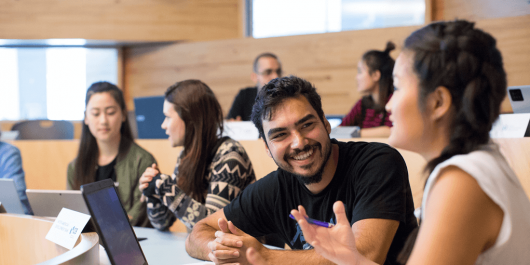
Download a handy course guide for all the latest info on courses offered through the Faculty of Arts and Social Sciences (FASS).

FASS Lane blog
Gain some insider knowledge thanks to our handy student-written blogs and how-to guides.

Reputation and facilities
Find out how FASS courses rank, and explore our industry-standard equipment and facilities; from sound studios and animation suites to visual arts studios and science labs.

International opportunities
Find out about In-country study (ICS) programs FASS has on offer for students wanting to study overseas as part of their degree.
Domestic students
Before you apply.
Here are a few important things for you to check out before you apply:
- admission requirements for this course. These can be found on the overview tab and there may also be additional entry requirements
- required levels of English proficiency for the course you're interested in.
- recognition of prior learning guidelines if you've undertaken previous study that might be credited towards your course at UTS.
How to apply
Domestic applicants can apply via the Universities Admissions Centre (UAC) (opens an external site)
UAC code(s): 600033 (Autumn session, Spring session, Spring session)
Make a note of the relevant UAC code before starting the UAC application.
Autumn Session 2025 Spring Session 2025
Important dates
Need more information, scholarships, prizes and awards, international students.
- admission requirements for this course. These can be found on the overview tab and there may also be additional entry requirements .
- required levels of English proficiency for the course you’re interested in.
- recognition of prior learning guidelines if you’ve undertaken previous study that might be credited towards your course at UTS.
You can meet an international student advisor at one of our events worldwide to ask questions and submit an application.
Visit the UTS Handbook for full academic dates. Visit essential information for international students for the application closing dates.
International applicants can apply to study through UTS International.
International applicants who are currently doing:
- an Australian Year 12 qualification in or outside Australia
- an International Baccalaureate, or
- a New Zealand National Certificate of Educational Achievement (NCEA) Level 3
can apply through the Universities Admissions Centre (UAC) (opens external site).
Apply online
Ask a question
UTS acknowledges the Gadigal people of the Eora Nation, the Boorooberongal people of the Dharug Nation, the Bidiagal people and the Gamaygal people, upon whose ancestral lands our university stands. We would also like to pay respect to the Elders both past and present, acknowledging them as the traditional custodians of knowledge for these lands.


IMAGES
VIDEO
COMMENTS
Sheridan will ensure that all students admitted to the Honours Bachelor of Creative Writing and Publishing program during the period of consent will have the opportunity to complete the program within a reasonable time frame. Credentials earned during the period of consent remain valid, even if Ministry consent to offer the program is withdrawn ...
Learn from writing and publishing industry leaders and fast track your career in editing and publishing, digital media, advertising and marketing, festivals and events and more. ... a strong portfolio to gain employment in the industry or to be used for applications into another degree such as the Bachelor of Creative Arts (Creative Writing ...
The Creative Writing and Publishing Major can be selected in the Bachelor of Creative Industries, Bachelor of Communication, Bachelor of Design, Bachelor of Business/Bachelor of Creative Industries, Bachelor of Arts, and select double degrees that include the Bachelor of Arts. The Creative Writing and Publishing Minor can be selected in the ...
The on-campus Bachelor of Arts (BA) in Writing, Literature and Publishing program focuses on literary history and the world of publishing. The creative writing and critical thinking skills that students develop will prepare them for future study or a career in the arts or communication field.
A bachelor's degree in creative writing requires about 120 credits and takes four years of full-time study to complete. Accelerated programs may take less time.
Housed in the Department of Writing, Literature and Publishing in the School of the Arts, the program's faculty teach courses in magazine writing, copywriting, creative writing, literary studies, and traditional and digital publishing, exploring topics from a multitude of theoretical and cultural perspectives. Our Writing, Literature and ...
The online Bachelor of Arts (BA) in Creative Writing with a concentration in Poetry degree program is an opportunity for aspiring poets to find inspiration, engagement and creative collaboration with peers and faculty alike. Our specialized program enables you to hone your craft and unleash your imagination, helping you create imagery in verse. While a poetry degree is valuable in and of ...
For those with an interest in different forms of creative writing and publishing, this practice-based course provides the skills and industry knowledge to work in the field. The Bachelor of Communication (Writing and Publishing) at UTS is an industry-led course, designed and taught by a team of award-winning published authors, editors, scholars ...
Four Level 2 Creative Writing major subjects: CWG200, CWG210, CWG220 and CWG240. Four Level 2 Professional Writing and Publishing major subjects: PWP210, PWP211, PWP230 and PWP240. Level 3. Three Level 3 Creative Writing major subjects: CWG310, CWG340 (double subject) and choose from CWG300 ; OR CWG320.
The Curtin University Professional Writing and Publishing degree prepares students for writing careers in the private, public and creative sectors through the study and practice of a range of different writing forms, including feature articles, speeches, reports, discussion papers, travel writing, history, personal essays, memoir, website copywriting, social media writing, promotional writing ...